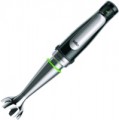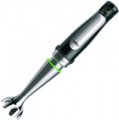Main bowl
The volume of the main bowl supplied with the device.
For more information about the main bowl, see "Capacities". And the amount of product that can be loaded into the device at a time directly depends on its volume. On the other hand, a capacious bowl has the appropriate dimensions and cost, and also puts forward increased requirements for engine power. Therefore, you should choose according to this parameter, taking into account real needs. And also you should consider that for stand mixers with a bowl, in most cases, the volume means the total size, and not the useful one. The bowl must be filled less than 2/3 during cooking (here it is already individual and you need to look at the instructions for the product).
Grinding bowl
The working volume of the grinding bowl, supplied with the device.
For more information about the bowl for grinding, see "Capacities". And the amount of product that can be grinded in the device in one load directly depends on its volume. At the same time, keep in mind that a larger bowl takes up more space, costs more, and also requires a more powerful engine. Therefore, manufacturers usually select this volume taking into account the overall level and performance of the device.
Capacities
Types of capacities that the device was originally equipped with.
In addition to
the main bowl, the package may include
a bowl for chopping,
a coffee grinder,
a measuring cup and a
travel shaker bowl. All of them are described in detail in this list, with the exception of the shaker — see a separate paragraph below about it.
— Main bowl. The main capacity of an appliance is called the general purpose bowl, and its design varies depending on the type of device. It can be a deep bowl for stand mixers, a jug with knives at the bottom for countertop blenders, or a chopper jar with removable knives for hand blenders and choppers. However, not all appliances come with a main bowl, and in some cases, users are expected to choose their own container.
— Bowl for chopping. Capacity with removable knives is an essential component for chopping products. This container is typically referred to as a grinding bowl, and when it's included in a grinder's delivery set, it's considered the main bowl. However, some devices have a grinding bowl as the main bowl, and knives are a necessary part of its structure.
— Grinder (for coffee). The coffee grinder container is specifically designed for grinding coffee, nuts, spices, sugar, and other products. It usually contains knives similar to th
...ose in blenders, but is distinguishable from the main blender container due to its much smaller volume.
— Measuring cup. The measuring capacity is a transparent glass with a scale that enables the user to measure specific volumes of liquid and bulk products. The accuracy of the scale may vary, but for regular use, it's typically sufficient.Nozzles
—
Blending arm. A blending nozzle is a long rod-like attachment with a protective cap at one end, containing a bladed knife. It can be attached to a conventional mixer, essentially turning it into a blender.
—
Wide blending arm. A blending nozzle, or blending arm, is a long rod-shaped attachment with a protective cap at one end, housing a bladed knife. The wider width of the blending arm allows for faster blending and easier processing of larger quantities of food products.
—
Beaters for whisking. Whisking nozzles for liquids such as cream, eggs, and batter, are commonly found in modern mixers as a standard attachment.
—
Kneading hook. Special nozzles in the form of thick wire spirals, designed for kneading thick dough.
—
Knife for chopper. A cutting-type attachment with blade knives attached to the bottom of a cylindrical shaft and turned at a 180-degree angle to each other. It is used for grinding ingredients of different hardness in the blender jar. The cutting elements of such knives can have both straight and serrated blades.
—
An ice pick. An ice pick is a specialized tool for crushing ice, nuts, and frozen fruits/berries. Its serrated blades make it easier to break the solid structure of ice without dulling the blades. I
...t is commonly used with powerful blenders that come with a glass or metal chopper bowl. Although not all blenders include an ice pick, it can be purchased separately along with a heavy-duty chopper bowl main function crushing ice and other hard ingredients.
— Knife for kneading dough. The kneading knife is ideal for making yeast dough with a less dense structure in small quantities. It can also be used for mixing and whipping creams. Typically, this type of knife is made from durable plastic that pulls the mass rather than cutting it like steel. For larger volumes of dough, it is recommended to use a specialized hook attachment instead.
— Disc for shredding/slicing. A slicing disk is a circular attachment with slots that function as blades when rotated. This feature enables it to rapidly and uniformly slice fruits and vegetables into thin pieces, making it particularly useful for processing large quantities of food.
— For dicing. This attachment is designed to cut fruits and vegetables into small, uniform cubes. It is particularly useful for preparing salads and traditional soups.
— For puree. This is a plastic attachment typically used for creating smooth purees and thick blends from fruits and vegetables.
The presence of a sieve in the delivery set of the device.
— Pulp sieve. Typically found in conventional blenders, this device is a vertical tube with fine mesh walls that fits into the bowl and sits atop the blade. Its primary function is to separate pulp from fruit and vegetable juices: produce is placed inside the tube, the blade crushes it, and the juice is filtered through the mesh into the bowl while the pulp remains inside the tube.
— Cappuccinatore (frother). This device is specifically designed for creating milk foam and is used only with specific appliances (refer to "Device type - Foamer"). It typically consists of a bowl with a foaming mechanism at the bottom, rather than a nozzle, and is often not detachable.
Other types of nozzles, in addition to those described above, can be supplied in the kit.Main bowl material
The substance that the jar of the countertop blender is made of (refer to "Device type"), or the material of the blender attachment (refer to "Nozzles"). The most widely used materials are:
—
Plastic. Plastic is a popular choice for blender jars due to its low cost, lightweight, and sufficient strength for kitchen use. Its transparency allows for easy monitoring of the product being blended. However, plastic is prone to scratching, which can cloud the bowl and reduce the device's appearance. Scratches can occur from everyday use or rough cleaning with abrasive products.
—
Glass. Glass blender jars are transparent and allow for easy monitoring of the contents. They are more resistant to scratches than plastic and do not lose transparency during use. Cleaning them harshly does not affect their transparency, and any cloudiness can be easily removed. However, glass is heavier, more expensive than plastic, and is more sensitive to impacts. A glass blender jar can break from a fall that plastic could withstand.
— Metal. Metal blender jars are durable and stylish, often surviving falls without damage. However, they are less convenient than plastic because their opaque walls make it difficult to observe the blending process. Metal is also more expensive than plastic, making it less commonly used, mainly in high-end devices.

